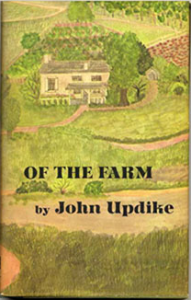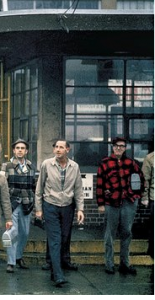The ubiquitous Adam Begley has written a piece for The Wall Street Journal titled “Adam Begley on mighty mothers,” in which he names five books that feature dominant matriarchs. Given his recent biography of John Updike it’s no surprise that he included Updike, and even less of a surprise that the book he chose was Of the Farm, the novel that Updike has said was written about his mother. You need to subscribe to access the full article, which was published in the Bookshelf/Life & Culture section on May 16, 2014, but here’s what he had to say about Updike:
By John Updike (1965)
4. There are only four voices in this gem of a novel, a fractious quartet performing under a spotlight in and around an elderly widow’s isolated Pennsylvania farmhouse. Joey Robinson, a 35-year-old mama’s boy, has brought his second wife, Peggy, and her young son to visit Joey’s garrulous, manipulative mother. By the second night, Joey’s mother has bullied him into agreeing that Peggy is vulgar and stupid and that divorcing his first wife was a mistake. After an emotional melee worthy of Edward Albee, mother and son achieve a kind of mutual forgiveness. But when all the skirmishes are done, and all the wounds more or less neatly bandaged, Joey and his mother engage in a bit of pointed banter about selling the farm after she is dead. She refers to it as “my farm,” and before he replies, Joey reflects: “We were striking terms, and circumspection was needed. I must answer in our old language, our only language, allusive and teasing, that with conspiratorial tact declared nothing and left the past apparently unrevised.” He says, “Your farm? . . . I’ve always thought of it as our farm.” The mother-son conspiracy endures.



